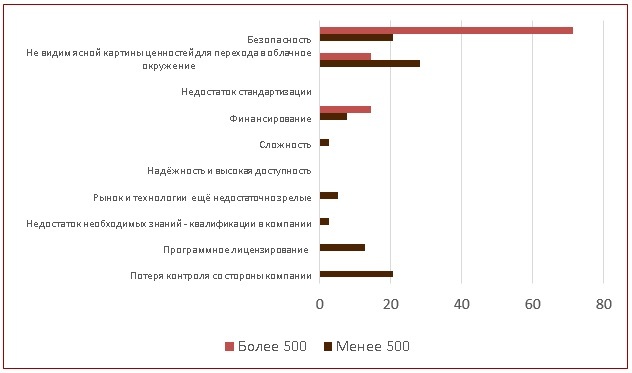Who is faster: "clouds" vs "IT market"?
The demand for cloud technologies in Russia is not the future, but already a reality. Just a few years ago, only the Russian cloud market that is gaining momentum today is growing several times faster than the IT market as a whole. Since 2011, the popularity of clouds has increased by 44% annually, while the IT industry as a whole in mature markets - by only 23%. According to Orange, in 2016 its volume will amount to 19 billion rubles, and now the cloud services segment occupies about 13% of the total IT services market.

According to a BSA study of 24 countries of the world, Russia ranked 17th in the countries ’readiness rating for cloud computing, ahead of the dynamically developing markets of India, China and Brazil. High rates of growth in the use of cloud solutions in our country are connected with the fact that companies consider them, first of all, as a tool to reduce costs and optimization due to more efficient use of IT infrastructure and flexible payment models (pay as you go). And also, with the fact that cloud solutions have a high rate of implementation of changes and provide additional business growth in a highly competitive environment. At the same time, one of the main criteria when choosing cloud services remains the trust of customers in matters of security and protection of data and infrastructure, which they provide for servicing according to the outsourcing model.
')
The practice of ICL Services with customers shows that currently, the greatest interest in cloud services is observed in the retail and financial sector. However, such a cut may not fully correspond to marketing research on the Russian cloud market as a whole.
A company’s own research * of the maturity level of regional Russian markets and readiness for cloud services showed that about 35% of surveyed companies considered switching to cloud solutions or are already actively using this technology in their practice. Representatives of companies that have more than 500 jobs, are more loyal to cloud services, and about 20% of them are at the stage of choosing a reliable supplier and have their own requirements. Among them is a convenient format for integrating existing systems and ensuring information security.
The analysis showed that most companies have no idea about the diversity of the cloud environment. Almost 22% do not know what to prefer. On the cloud market, such service delivery models as IaaS (IT infrastructure rental), SaaS (application rental) and PaaS (IT platform rental) are traditionally defined. Often, there are other types of services: BPaaS (services for solving business problems), DaaS (virtual desktop), SecaaS (information security for rent), BaaS (backup as a service), DRaaS (solutions for disaster recovery), CCaaS ( virtual contact center).
However, as Alexey Shipov, Head of Development of the ICL Cloud Cloud Platform , points out, the most popular service today is IT infrastructure rental (IaaS). Software rental (SaaS) comes second, with the ability to integrate with the customer's existing IT infrastructure and ensure data security. Corporate clients, who independently develop and deploy business applications, are increasingly looking at platform services (PaaS), which, by automating testing and built-in deployment tools, will significantly accelerate the deployment of business applications, while ensuring a high level of stability and scalability. ” Spikes.
Despite the growing popularity of "clouds", there are many difficulties that prevent the transition to cloud services. The graph below shows those mentioned by CIOs and IT managers of the services / departments of large and small companies (more than 500 and less than 500 jobs, respectively):

As can be seen from the graph, the difficulty in moving to the "cloud" is more concerned with companies with a small number of jobs. In the survey, about 10% of them said that going out to the clouds would force them to change the business model and 6% fear that cloud technologies will change their interaction with customers and suppliers. Therefore, notes Alexey Shipov, careful planning of transition to cloud platforms is extremely important for achieving results in the form of simplicity, accessibility and efficiency that cloud environments can offer.
A priority task in 2016 for companies of all sizes will be to reduce IT budgets while maintaining their high performance at lower costs. At the same time, with the development of all modern companies are faced with the issue of increasing the need for IT resources. In this situation, the choice in favor of cloud technologies, which make it possible to modernize the approaches to managing the IT infrastructure through the use of the latest technologies, a high level of standardization, flexibility of the implemented solutions and ease of scaling, looks like the most appropriate business decision.
* The study was conducted by filling in forms with elements of a telephone interview from August 25 to September 25, 2015.

According to a BSA study of 24 countries of the world, Russia ranked 17th in the countries ’readiness rating for cloud computing, ahead of the dynamically developing markets of India, China and Brazil. High rates of growth in the use of cloud solutions in our country are connected with the fact that companies consider them, first of all, as a tool to reduce costs and optimization due to more efficient use of IT infrastructure and flexible payment models (pay as you go). And also, with the fact that cloud solutions have a high rate of implementation of changes and provide additional business growth in a highly competitive environment. At the same time, one of the main criteria when choosing cloud services remains the trust of customers in matters of security and protection of data and infrastructure, which they provide for servicing according to the outsourcing model.
')
The practice of ICL Services with customers shows that currently, the greatest interest in cloud services is observed in the retail and financial sector. However, such a cut may not fully correspond to marketing research on the Russian cloud market as a whole.
A company’s own research * of the maturity level of regional Russian markets and readiness for cloud services showed that about 35% of surveyed companies considered switching to cloud solutions or are already actively using this technology in their practice. Representatives of companies that have more than 500 jobs, are more loyal to cloud services, and about 20% of them are at the stage of choosing a reliable supplier and have their own requirements. Among them is a convenient format for integrating existing systems and ensuring information security.
The analysis showed that most companies have no idea about the diversity of the cloud environment. Almost 22% do not know what to prefer. On the cloud market, such service delivery models as IaaS (IT infrastructure rental), SaaS (application rental) and PaaS (IT platform rental) are traditionally defined. Often, there are other types of services: BPaaS (services for solving business problems), DaaS (virtual desktop), SecaaS (information security for rent), BaaS (backup as a service), DRaaS (solutions for disaster recovery), CCaaS ( virtual contact center).
However, as Alexey Shipov, Head of Development of the ICL Cloud Cloud Platform , points out, the most popular service today is IT infrastructure rental (IaaS). Software rental (SaaS) comes second, with the ability to integrate with the customer's existing IT infrastructure and ensure data security. Corporate clients, who independently develop and deploy business applications, are increasingly looking at platform services (PaaS), which, by automating testing and built-in deployment tools, will significantly accelerate the deployment of business applications, while ensuring a high level of stability and scalability. ” Spikes.
Despite the growing popularity of "clouds", there are many difficulties that prevent the transition to cloud services. The graph below shows those mentioned by CIOs and IT managers of the services / departments of large and small companies (more than 500 and less than 500 jobs, respectively):

As can be seen from the graph, the difficulty in moving to the "cloud" is more concerned with companies with a small number of jobs. In the survey, about 10% of them said that going out to the clouds would force them to change the business model and 6% fear that cloud technologies will change their interaction with customers and suppliers. Therefore, notes Alexey Shipov, careful planning of transition to cloud platforms is extremely important for achieving results in the form of simplicity, accessibility and efficiency that cloud environments can offer.
A priority task in 2016 for companies of all sizes will be to reduce IT budgets while maintaining their high performance at lower costs. At the same time, with the development of all modern companies are faced with the issue of increasing the need for IT resources. In this situation, the choice in favor of cloud technologies, which make it possible to modernize the approaches to managing the IT infrastructure through the use of the latest technologies, a high level of standardization, flexibility of the implemented solutions and ease of scaling, looks like the most appropriate business decision.
* The study was conducted by filling in forms with elements of a telephone interview from August 25 to September 25, 2015.
Source: https://habr.com/ru/post/282566/
All Articles